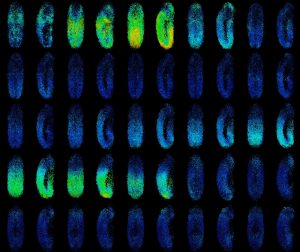Ph.D. Position in Computer Science applied to Developmental Biology
Posted by Léo Guignard, on 21 January 2021
Closing Date: 15 March 2021
Our group is seeking a highly motivated candidate strongly interested in interdisciplinary science, to join the Guignard lab and work on a project at the crossroad between Computer Science and Developmental Biology as a Ph.D student.
Deadline: Until filled
Apply directly by email to leo.guignard+lab[at]gmail.com
Automatic reconstruction of Drosophila average embryonic development at the single-cell scale
The role
We are seeking a highly motivated candidate, strongly interested in interdisciplinary science, to join our group and work on a project at the crossroads between Computer Science and Developmental Biology.
The project aims at developing computational methods and models to better understand how robustness to biological noise is achieved during the development of Drosophila embryos. This will be done by first quantifying and characterising Drosophila embryogenesis variability at the single cell scale.
The successful candidate will be tasked to build statistical representations of the morphogenesis of Drosophila embryos at the single cell scale by combining image analysis, big-data science and data visualisation. To this end, the candidate will first develop novel image and big-data analysis algorithms. These algorithms will be first applied to 3D movies of Drosophila embryos acquired with state-of-the-art light-sheet fluorescence microscopes. The successful candidate will then develop novel algorithms to combine the set of recorded embryos together to build a single-cell scale, in-toto, atlas of Drosophila embryogenesis.
Depending on the advancement of the project and the candidate preferences, the second part of the project will then focus around either integrating complementary single-cell omic data to the atlas or developing machine-learning based methods to analyse, detect and classify cell patterns in the developing embryo.
Keywords
Computer Science, Image Analysis, Big-data, Developmental Biology, Drosophila Embryogenesis
Who would we like to hire?
Required experience
The candidate must have at least one of the following expertises:
- Computer Science: Image Analysis, Graph Theory, Data Science
- Developmental Biology (sole experience in Developmental Biology requires to be able to show good coding skills)
Education and training
You hold a master degree in Bioinformatics, Computer Science, Developmental Biology (with good computational skills) or equivalent
Competences
- You are eager to learn
- You are creative
- You have good communication skills
- You want to work as part of a collaborative team
Languages
You have French or English fluency (at least B2 on the CEFR)
The Offer
- Contract duration: 3-year position, extension possible
- Target start date: from July 2021
- The salary will be based on Aix-Marseille University’s salary scale, depending on the candidate’s profile and experience
Application Procedure
All applications must include:
- A motivation letter addressed to Léo Guignard.
- A complete CV including contact details.
- Contact details of at least one (for Ph.D. candidates) or two (for postdoc candidates) referee(s).
All applications must be sent to Léo Guignard by email with the mention [Job-2021] in the subject at the address leo.guignard+lab[at]gmail.com.
Selection Process
Pre-selection: The pre-selection process will be based on qualifications and expertise reflected in the candidates CV and motivation letter. It will be merit-based. All candidates will be informed whether they have been pre-selected or not.
Interview: Pre-selected candidates will be contacted to coordinate a set of interviews with a set of selected members of CENTURI (including Léo) and a seminar. The interview will include a computational skill test (no specific coding language is required).
Relevant publications
- Guignard L.*, Fiuza U.-M.*, et al., Contact area-dependent cell communication and the morphological invariance of ascidian embryogenesis, Science, 369(6500):eaar5663, (2020)
- McDole K.†, Guignard L.†, et al., In Toto Imaging and Reconstruction of Post-Implantation Mouse Development at the Single-Cell Level, Cell, 175(3):859-876, (2018)
- Amat F., et al., Fast, accurate reconstruction of cell lineages from large-scale fluorescence microscopy data, Nature Methods 11, 951 (2014)
About the team
We are a group of computer scientists with a strong interest in biology in general and more specifically in embryonic development. We develop novel computational methods and models that allow the analysis of very large 3D movies of animal embryonic development (up to 2TB per movie). We work closely with biologists to tailor our methods so that they help to address fundamental biological questions.
The developmental biology question that mainly animates us is to better understand the mechanisms driving the reproducibility of embryogenesis.
For further information about the lab you can visit our website guignardlab.com, our twitter @guignardlab or contact directly Léo Guignard via email: leo.guignard+lab[at]gmail.com
The Institute
The Turing Centre for Living Systems (CENTURI) is an interdisciplinary project located in Marseille (France).
CENTURI aims at developing an integrated interdisciplinary community, to decipher the complexity of biological systems through the understanding of how biological function emerges from the organization and dynamics of living systems.
The project federates 15 teaching and research institutes in biology, physics, mathematics, computer science, engineering and focuses on Research, Education and Engineering, 3 missions that hold interdisciplinary as their core principle.
The research and training programmes implemented under the auspices of CENTURI will foster new collaborations, transform practices, attract new talents and thereby contribute to making the Luminy campus a leading site for the interdisciplinary study of biological systems.



 (No Ratings Yet)
(No Ratings Yet)